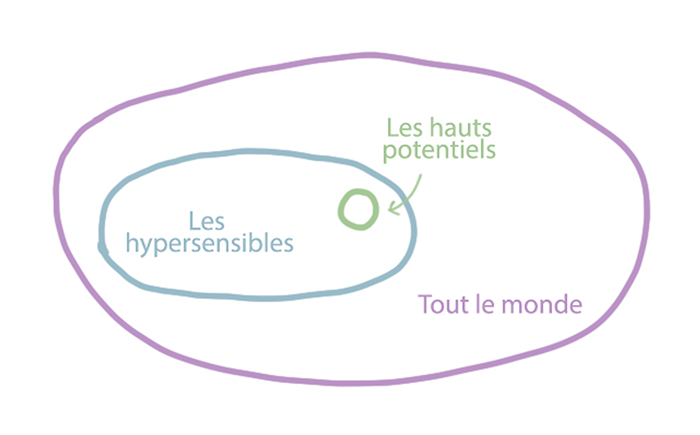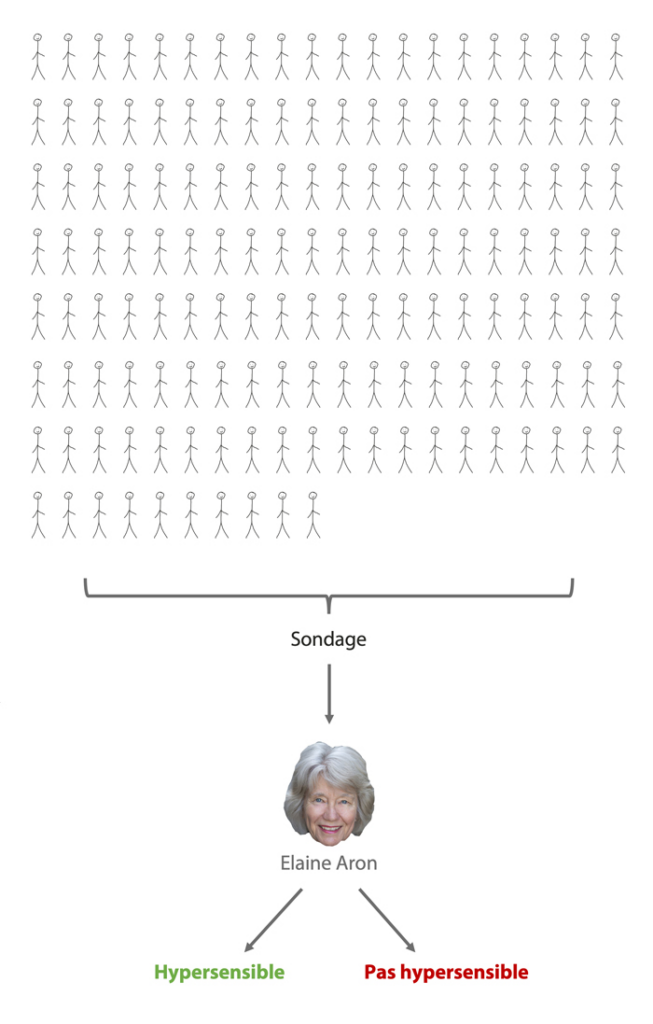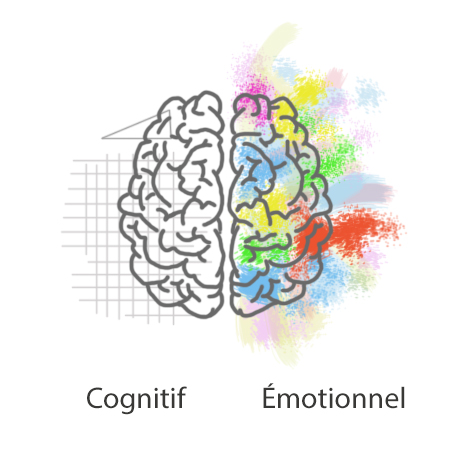Hello ! Aujourd’hui on va s’intéresser à la façon dont les personnes hypersensibles ressentent leurs émotions. En fait vous avez été vraiment beaucoup à interagir avec ma dernière vidéo sur le sujet du coup j’ai voulu approfondir.
Si vous êtes une personne hypersensible, restez bien jusqu’au bout parce que je vais vous donner de nombreux conseils pour ne pas vous sentir envahi complètement par vos émotions. En effet, on va parler d’une technique d’intelligence émotionnelle : la régulation émotionnelle. Sans ses connaissances vous ne serez pas maître de vos émotions et c’est elle qui vont vous gouverner.
Je m’appelle Paul et mon haut potentiel a été découvert il y a plus de dix ans maintenant. Et aujourd’hui j’ai décidé de partager tout ce que j’ai appris sur Connect The Dots.
NB : cet article est la retranscription de la vidéo ci-dessus.
La vie est faite d’émotions
La vie est faite d’émotions et ça peu importe qui on est, notre sexe, notre origine, notre personnalité… La vie c’est des émotions.

Malgré tout ça, vous avez certainement remarqué que certains d’entre nous les ressentent plus que d’autres. Votre tristesse peut par exemple complètement vous écraser. Votre joie vous faire sentir tout léger comme si vous marchiez sur un petit nuage. Vous pouvez pleurer facilement. Ou alors être beaucoup plus stressé que les autres. Je me souviens par exemple on me disait toujours « Allé, Paul, sois un homme. Arrête de pleurer« . Mais je ne pouvais pas j’étais comme ça.
Mais rassurez-vous si jamais vous avez des sentiments qui vous semblent beaucoup plus grands et plus importants que ceux des autres, c’est normal. C’est de la science. Je vais vous expliquer.

Ça, c’est tous les gens qu’il y a sur la Terre. Eh bien parmi ces gens-là, il y a environ 15 à 20 % qui sont des personnes que l’on appelle hypersensibles. C’est qu’en fait elles vont être stimulées en profondeur, enfin elles vont traiter cette stimulation en profondeur plutôt. C’est aussi de la haute sensibilité, un traitement sensoriel fort, un haut potentiel émotionnel… il y a plein de noms pour désigner cette chose-là. Je précise tout de suite que c’est quelque chose de tout à fait normal et de sain. Ce n’est pas une maladie. Il ne faut pas s’inquiéter.
Cette hypersensibilité est également présente chez les personnes zèbres. C’est d’ailleurs pour ça que j’en parle sur cette chaîne. Les personnes surdouées sont donc hypersensibles. Mais tous les hypersensibles ne sont pas à haut potentiel.
Les hypersensibles ressentent les émotions négatives de manière plus intense
Aujourd’hui on va s’intéresser à quelques études scientifiques que j’ai sélectionnées parce qu’elles viennent démontrer à quel point les émotions sont ressentis de manière très forte chez les hypersensibles. La première, c’est une étude qui a été publiée en Australie en 2015. Les chercheurs ont fait participer 150 participants qui étaient âgés de 18 à 60 ans. Ces 150 personnes ont rempli un sondage dans lequel on leur demandait leur niveau de stress, d’anxiété, ou d’autres informations sur leurs émotions – mais c’était très orienté sur les émotions négatives.
Ensuite les chercheurs ont interrogé ces 150 personnes. Ils leur ont fait passer un test d’hypersensibilité fait par Elaine Aron qui a permis de définir si ces personnes étaient hypersensibles ou non.

Ce qu’ils en ont conclu (ça m’avait un peu déprimé la première fois en le lisant) c’est que les personnes hypersensibles étaient (un peu sans surprise) beaucoup plus conscientes des sentiments négatifs. Ils les vivaient beaucoup plus intensément que soit de l’anxiété, du stress, de la dépression, de la tristesse. Tous ces sentiments négatifs et ces émotions négatives été vécus de manière beaucoup plus forte.

Les hypersensibles sont plus sensibles aux émotions positives
Alors comme je vous l’ai dit ça peut sembler déprimant, mais j’ai continué à lire des études scientifiques et je voulais maintenant vous parler d’une autre qui a été publiée un an plus tard (certainement suite à celle-là, je n’en sais rien) et dans laquelle cette fois ils ont montré à des participants des images qui avaient une forte charge émotionnelle, qui étaient intenses émotionnellement. Alors là ces quatre images d’illustration c’est pas du tout ces images-là qu’ils leur ont montré. C’était juste pour illustrer mes propos. Donc ces images ont été montrées à 100 personnes. Sur ces 100 personnes, il y en avait la moitié qui était hypersensible et l’autre moitié qui ne l’était pas (donc 50 et 50).

Et après pareil : on leur a demandé de parler de leur ressenti. Exactement comme dans l’étude d’avant en gros. Et là ce qui ressorti c’est que, oui il y avait des émotions négatives qui étaient vécues plus intensément, mais les émotions positives, l’intensité émotionnelle positive, était encore plus forte et elle prenait le dessus.

Donc retenez bien que chez les hypersensibles les bas sont très bas, mais les hauts sont très hauts aussi. Il faut en parler, on n’est pas que des gens tristes tout le temps chez les hypersensibles. On peut aussi être hyper joyeux et je trouve que c’est important à noter. Si vous n’avez pas vu lu mon article précédent sur le fonctionnement du cerveau hypersensible je vous invite vraiment à le lire. Principalement la partie où je parlais d’une étude où ils avaient fait passer des IRM et on voyait les parties du cerveau qui s’activaient.
C’est quoi la régulation émotionnelle ?
Donc qu’est-ce qu’on fait à ce sujet pour nos émotions et gérer notre hypersensibilité ?
En fait il y a un truc qui s’appelle la régulation émotionnelle. Vous en avez d’ailleurs très certainement entendu parler. Mais qu’est-ce que c’est ? Alors c’est un sujet un peu nouveau que j’ai lu rapidement. Il y a encore peu d’études dessus donc il faudra peut-être attendre et prendre ça avec des pincettes, mais je pense c’est intéressant de l’avoir en tête quand même. Ce qu’ils trouvent (grosso modo) c’est que les personnes hypersensibles font beaucoup moins de régulation émotionnelle que les autres. Ils la pratiquent moins.
Qu’est-ce que c’est du coup ? (J’ai oublié de le dire). On prend une émotion. Cette émotion est la réponse physiologique, comportementale, et expérientielle à l’évaluation qu’on fait d’une situation. Donc l’interprétation et l’évaluation qu’on fait de cette situation crée une émotion. Cette émotion là on la gère de notre façon. C’est cette gestion et cette régulation qui s’appelle régulation émotionnelle. C’est aussi simple que ça.

Ça va être par exemple, si vous êtes frustré ou énervé, est-ce que vous prenez du recul ? Est-ce que en période de stress vous allez marcher ? Si vous êtes en colère est-ce que vous arrivez à trouver des raisons de rire ?
C’est vraiment cette façon de réguler l’émotion, de l’accompagner pour la transformer. Il ne s’agit pas du tout de l’enfermer et de ne pas la vivre. Il s’agit vraiment de l’accompagner pour la faire sortir d’une manière saine et qui ne soit pas destructrice. Alors pourquoi les hypersensibles la pratiquent moins ? On ne sait pas trop… Est-ce que c’est parce qu’on a été longtemps envahis et malmenés par nos émotions ? On ne sait pas. Peut-être qu’on traite les émotions tellement profondément (y compris les émotions négatives) qu’elles vont rester un peu plus longtemps en nous. Je ne pas si c’était clair. Peut-être que vu qu’on les vit très fort, il faut aussi plus de temps pour que ces émotions s’en aillent. Je ne sais pas. Les scientifiques ne savent pas encore trop donc je veux pas m’avancer là-dedans. Ce qu’ils ont juste remarqué c’est que les hypersensibles font moins cette régulation émotionnelle.
La régulation émotionnelle en 5 étapes
Malgré tout, voici quelques petits conseils pour améliorer votre propre régulation émotionnelle. Ça se passe en cinq 5 étapes.
(1) La première étape consiste à accepter son sentiment. Comme je vous l’ai dit, il ne faut pas le refouler. Il faut l’accepter, prendre en compte qu’il est là, qu’on le vit, et que c’est normal. En plus de l’accepter, il y a une grosse partie de réalisation et d’identification de nos émotions.
(2) Ensuite il ne faut pas en avoir honte. Quand j’étais petit on me disait « Paul t’es un homme il ne faut pas pleurer » et du coup j’avais honte de pleurer. Il ne faut pas. Les émotions c’est quelque chose de naturel et il n’y a aucune honte en avoir. Ça va être plutôt des hontes d’être soit dans les états tristes, dépressifs, plutôt des émotions négatives. On aura généralement moins honte d’être heureux. Mais peu importe il faut vraiment l’accepter et ne pas en avoir honte.
(3) Ensuite il faut que vous ayez confiance que vous pouvez vous débrouiller aussi bien que les autres. Et ce que ce soit dans la gestion de ces sentiments et de ces émotions ou de ce qui a induit ce sentiment.
(4) Quatrième étape, réaliser que les sentiments négatifs ne durent pas longtemps – enfin ne dureront pas éternellement. Par exemple les déceptions amoureuses ça nous est tous arrivé. Sur le moment c’est la fin du monde, mais chaque jour ça va quand même un peu mieux. C’est toujours ça. Vous avez peut-être eu des décès dans votre entourage. C’est très dur quand ça arrive mais petit à petit on s’en remet. Ça va un peu mieux. Et même si quand ça arrive on a l’impression que ça n’ira jamais mieux, avec le recul on se rend compte qu’on apprend à vivre avec ça et que ça va mieux. Donc sur le moment où ça arrive, la prochaine fois que ça vous arrivera, rappelez-vous que ça ira mieux et que la situation dans laquelle vous êtes, vous l’avez certainement déjà vécue (et que c’est allé mieux après).
(5) La dernière étape concerne surtout les émotions sur lesquels on peut faire quelque chose. Un décès on ne peut pas y faire grand-chose. Il faut le gérer mais la personne on ne peut pas la faire revivre. Par contre si on est triste parce qu’on a fait une bêtise amoureuse, on peut essayer de régler la situation (ou du moins de l’arranger ou de faire que ça se passe un peu mieux). C’est ça cette étape. S’il y a possibilité de faire quelque chose pour gérer, pour améliorer un sentiment un peu négatif, faites-le. Ça peut être aussi aller marcher quand on est en colère ou stressé. Moi je le fais tout le temps. Je suis quelqu’un de très stressé et j’ai besoin de marcher tous les jours, de faire quelque chose. C’est aussi cette étape-là.
Technique de régulation émotionnelle : le cerveau cognitif et le cerveau émotionnel
Une autre stratégie que je trouvais intéressante consiste à imaginer qu’on a deux cerveaux : un cerveau qui va être émotionnel et un cerveau plutôt cognitif.

Le cerveau cognitif est celui qui sert à faire la raison. Il est rationnel. Il est factuel et il aide à contrôler les émotions.
Lorsque notre cerveau émotionnel (notre hypersensibilité) part en folie il prend le dessus. Lorsque ce moment arrive (que le cerveau émotionnel prend le dessus) généralement le cerveau cognitif a tendance à s’endormir. C’est pour ça que les émotions nous font partir dans tous les sens.
Ce qu’il faut c’est, dans ces moments-là, remettre en fonctionnement, refaire marcher le cerveau cognitif, le remettre en ligne. Comment on peut faire ça ? Par exemple en parlant de ses sentiments, en les verbalisant ou du moins en les écrivant si on ne peut pas parler. Quand vous avez un moment de grande émotion, que vous vivez quelque chose qui est dur à gérer, essayez d’appeler quelqu’un ou de l’écrire sur un bout de papier. « Je me sens triste parce qu’il y a eu ça et je le ressens comme ça et ça me fait ça« . Ça va vous permettre de mettre des mots sur cette émotion et de la délimiter.
Par exemple si vous êtes au bureau et qu’il y a un moment très triste, allez vous enfermer dans les toilettes, allez faire un tour, faite quelque chose. Isolez-vous pour que vous puissiez mettre des mots dessus, prendre un peu de temps. Posez-vous des questions régulièrement : « Comment je vais ?« , « Est-ce que je ressens des émotions ? » de manière préventive.
Pour ce faire je vous invite vraiment à faire de la méditation. Je me suis mis très sérieusement début 2021 (c’est ma bonne résolution de l’année d’en faire tous les jours !) mais ça faisait quelques années que j’en faisais quand même. Ça m’aide vraiment énormément (quand il y a les émotions qui me surchargent) à prendre du recul et à me dire « Ok Paul, ça va pas là parce que tu ressens cette émotion à cause de ça« . Je lui mets un nom à cette émotion. Je vois d’où elle vient. Je lui mets des limites et ça m’aide à mieux la gérer et à surtout ne pas me sentir envahir par elle.
Sources
- Acevedo B., Aron E., Jagiellowicz J., Marhenke R., (Clinical Neuropsychiatry), Sensory processing sensitivity and childhood quality’s effects on neural responses to emotional stimuli, 2017.
- Aron A., Aron E., (Journal of Personality and Social Psychology), Sensory-Processing Sensitivity and Its Relation to Introversion and Emotionality, 1997.
- Aron A., Aron E., Jagiellowicz J., (Social Behavior and Personality), Relationship between the temperament trait of sensory processing sensitivity and emotional reactivity, 2016.
- Aron E., The Highly Sensitive Person: How to Thrive When the World Overwhelms You, 1997.
- Bakker K., Brindle K., Moulding R., Nedeljkovic M., (Australian Journal of Psychology), Is the relationship between sensory‐processing sensitivity and negative affect mediated by emotional regulation?, 2015.
- Harvard Medical School, Major Depression, What Is It?, 2018.
- National Institute of Mental Health, Borderline Personality Disorder.
